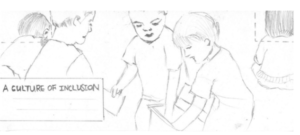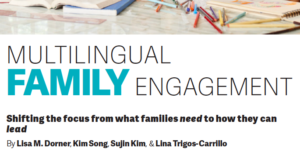
This image is a hand drawing of a photograph from a school district website ~2015. On their homepage, this district had a rotating, colorful set of pictures, with children working together, learning, and studying. At a glance, we might feel pride if this was our district, agreeing with the words written next to the images: “innovation, vision, leaders, inclusion, rising to the challenge.”
But we must take a closer look: Who are the children in the images? Who is centered? Who actually feels included in the district, and who is considered a challenge?
In a recent publication, “School District Responses to Cultural and Linguistic Change: Competing Discourses of Equity, Competition, and Community,” Dr. Sujin Kim and I explore these questions through a study of website design and district visions and missions (as of July 1, 2020, the full text is available at this link). We found that some district websites used a promotional genre “to sell” their quality to viewers (presumably families who either live or might be moving to the area). One website was quite jarring, putting words like “innovation” and “vision” next to white children, while placing the phrase “rising to the challenge” nearby the only Black student pictured. Meanwhile, Asian children, who made up a sizable number of students at this district at the time, were only ever featured with their faces blurred out or backs to the camera, as in the picture above, which suggests the very opposite of “inclusion.” Only one district in our study employed a narrative genre, using their website to tell the story of their development as a community that welcomed immigrants and refugees, with accompanying photos of smiling children with different skin tones and clothes, such as hijabs.
In our current times, it is (again) all too apparent that our country needs to learn that #BlackLivesMatter, that people of color, including immigrant families and multilingual indigenous peoples, have not been included, have been disenfranchised, have even in some cases been eliminated. I hope that by raising an awareness of the discourses around us, we can begin to break these cycles of exclusion and removal. This includes carefully attending to the ways that pictures and words come together in our lives, which are increasingly displayed and lived online: What subtle (or not so subtle) messages are they sending? How can we change harmful discourses by re-working images and words that we use and that we choose to share?
Tweet your ideas to #ChangeTheDiscourse @lisamdorner




